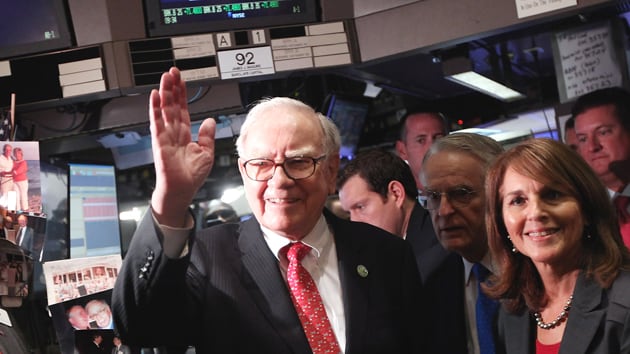Warren Buffett announced Tuesday that he has Stage 1 prostate cancer, a disease that untreated has an extremely high 5-year survival rate. Per the report, he will begin radiation therapy to reduce the risk that the cancer will spread.
The information was important for several reasons. First, it reminded us of how dispassionate the world of finance is. It turns out that Buffett too is just a slab of beef; shares of Berkshire Hathaway, which he leads, fell 1.5 percent following the announcement, and one expert said the news could “at least put a cap on the stock, which has underperformed in recent years.”
It also raised the larger issue of whether his treatment fits his disease. Finding stage I prostate cancer in an 81-year-old is like finding gray hair in an 81-year-old. As Forbes reported, about 80% of 80-year-old men have some detectable amount of prostate cancer if autopsied. So Buffett the person was neither under- nor overperforming. He was doing what most 81-year-old guys do. Assuming the reports that the cancer is limited to stage I are true, the real question is why he opted for a relatively aggressive approach (radiation is no picnic) for a condition that, left untreated but observed closely, was unlikely to cause him much harm.
We have arrived at an odd moment in American medicine when our ability to diagnose—with prostate screening, mammography, CT scans of the lungs of smokers, genetic profiles—has far outrun our ability to know what to do with the information. The clinical trials needed to fully understand the implications of a finding take too long; by the time we get a clinically useful answer, technology has moved onto other questions and contradictions.
Relevant to Buffett, we know that in a group of people with the same cancer caught at the exact same stage, some are at high risk for spread and others are not. Any doctor can recount the horrible story of someone with early-stage disease who was swept away unexpectedly within a few months. On the happy side, we also can recount the tale of someone—such as Michael Milken—with seemingly advanced disease who is alive many years later. Enormous research efforts are being made to understand the “high-risk” and “low-risk” groups, and for a few cancers, useful information is already available. But for most, right now in 2012, it remains a guessing game.

Where one’s own health is concerned, doubt is intolerable. Yes, Buffett almost certainly could have waited and watched and lived happily ever after without radiation. But there is a critical adverb up there: “almost certainly” is not the same as “certainly.” And squeezing out that “almost” both drives health-care costs way up and patients way crazy.
I know this first hand. Eighteen months ago, I was in a similar situation and had the opportunity to act like a cool-headed adult—but failed miserably. In the fall of 2010, I felt some fullness in my throat and eventually was worried enough to see a doctor. The doctor, to my grim surprise, was alarmed as well; he scheduled a PET scan. For the possible tumor he was worried about (but not all tumors), a PET scan is a very accurate way to determine if there was trouble ahead. A “hot spot” would strongly suggest cancer; no hot spot would mean the likelihood of cancer was incredibly low. I took the test and thankfully had no hot spot. Whew. But did that calm me down? Was I willing to maturely, calmly, cost-containment-ly sit and watch and wait, knowing that I was EXTREMELY unlikely to have cancer?
Of course not. I wanted the damn thing out. What sort of moron trusts a PET scan anyway? I became irrational and flunked the tough-guy test, the show-me-the-evidence test, the taciturn Gary Cooper test. I became a money-squandering wuss just like Buffett and thousands of others who see odds of 99-to-1 in their favor as stacked hopelessly against them.
We—the health-care system, the media, your nattering next-door neighbor—have done a fine job scaring the bejesus out of everyone, convincing us all that we are about to die of cancer, heart disease, strokes, kidney failure, asthma, contaminated spinach, superbugs, global warming, Alzheimer's, terrorists, and everything else. It’s a nonstop scare-a-thon out there in America right now; terrorism has become our dominant belief system, replacing the old isms of capitalism, communism, anarchism, or pacifism. It’s how we organize our day.
To keep the terror at bay we test and worry; treat with some drugs or maybe a surgery or some radiation; test some more and worry some more. It never ends. There’s always another disease waiting in the weeds. Buffett in his action has boiled down the entire health-care debate to its most elemental: what is the cost of peace of mind? Greedy doctors, dim bureaucrats, and sleaze-ball pharmaceutical companies (though we have plenty of each) haven’t created the health- care crisis that threatens to bankrupt the country; terror has. And the only remedy is not another antiterrorist poultice; it’s to calm down a little, already—an approach that I for one (and perhaps Warren too) failed at. Because believe me, it is not as easy as it looks.






